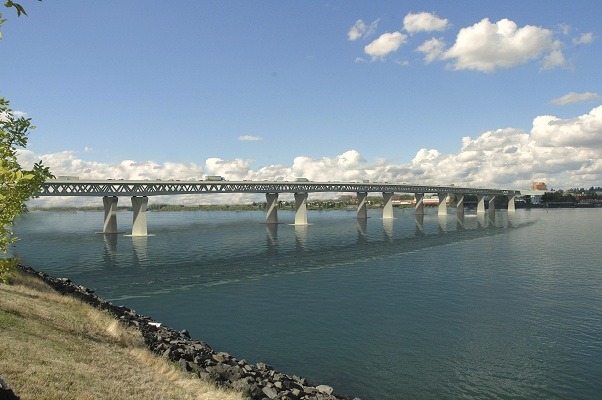With Thompson’s mitigation agreement in place, the Oregon Department of Transporation (ODOT) submitted it – along with the two other mitigation agreements – to the U.S. Coast Guard for review.
“We are pleased to have delivered signed mitigation agreements to the U.S. Coast Guard on schedule, to allow the Coast Guard to meet its deadline for a permit decision on the Columbia River Crossing project by September 30, 2013,” said ODOT Director Matthew Garrett in a statement. “These mitigation agreements are the result of months of hard work and intense negotiations with the three businesses. We arrived at fair and equitable agreements that are well within previous mitigation estimates. We have safeguards in place to ensure mitigation funds are provided only after the U.S. Coast Guard permit is received, necessary construction permits are secured, and ODOT awards a construction contract. At that point, the funds will provide opportunities for these businesses to improve their facilities, keep jobs and continue to invest in this region.”
The full statement by the governors read:
Washington Governor Jay Inslee and Oregon Governor John Kitzhaber today announced an agreement with Thompson Metal Fab Inc. to mitigate potential impacts of construction of a new I-5 bridge across the Columbia River. The agreement is the final of three mitigation agreements with Vancouver manufacturers and a crucial development in the effort to replace the aging Columbia River Crossing.
“Thompson Metal Fab is a vital partner in maintaining our state’s manufacturing sector,” said Washington Govermor Jay Inslee. “They depend on a navigable river as well as an interstate freeway that carries goods and people safely and efficiently. I couldn’t be more pleased they will have the opportunity to continue to invest in their businesses and we hope to see the company thrive in Washington state for years to come.”
In January 2013, the joint Oregon and Washington Columbia River Crossing project submitted a general bridge permit application to United States Coast Guard. The application described the economic and transportation benefits of the project and proposed mitigation for potential impacts on the fabricators’ navigation-dependent operations.
In May 2013, the states signed agreements with Oregon Iron Works, Inc. and Greenberry Industrial, LLC, manufacturers whose operations would be affected by a new bridge. The three mitigation agreements will be submitted as part of the Coast Guard permit application by August 30. The Coast Guard will issue a permit decision by September 30, 2013.
“Safe and reliable travel on I-5 is a crucial economic driver for both states, and we must do everything possible to build this bridge and remain competitive in this global marketplace,” said Governor Kitzhaber. “I’m pleased by the deliberative process the state and the businesses are undertaking to develop these agreements and bring us closer to construction.”
Some shipments from Thompson Metal Fab, Oregon Iron Works and Greenberry Industrial could be affected by the proposed bridge, which will have a maximum height of 116 feet. The Oregon Department of Transportation has been in discussions with the company, to determine how to mitigate the potential impacts while protecting the family-wage jobs they generate.
The aging I-5 bridges, built in 1917 and 1958, must be replaced to protect the drivers who make 128,000 daily trips across the span. The bridge is a critical component of the freight corridor that connects Canada to Mexico. More than $40 billion in freight crosses the bridge annually.




